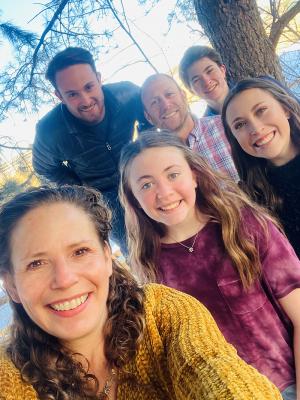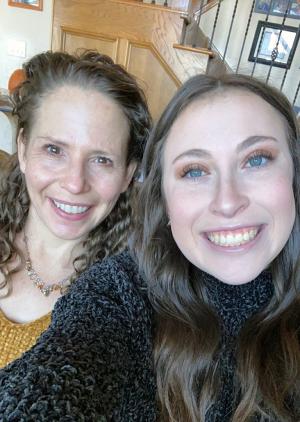Five questions for Ilana Spiegel

Support of public education has been a calling of Ilana Dubin Spiegel for decades. With experience in policy and politics at the state and local levels, she sought out a new role on the CU Board of Regents, won election last November in the 6th Congressional District and officially joined the governing group in January.
“What makes CU so special is the people who devote their work to serving our students, families, communities and state,” Spiegel said. “The foundation of our democratic republic lies on the ability of our people to make informed decisions and distinguish facts from conspiracy theories. The cornerstone of that foundation is our system of public schools and public institutions of higher education like CU.”
About two months in, Spiegel said she enjoys the work of a regent and already is devoting most of her time to bettering the University of Colorado.
“We have an amazing university, but there is always more we can do to keep improving CU,” she said. “That said, I try to carve out time most days for yoga, reading articles and listening to podcasts my 92-year-old father shares, and delivering food to family and friends cooked by my husband and daughter. (Secret: My husband, Jeff, is a fantastic cook, and my youngest loves baking). In non-pandemic times, I love watching my four kids do what they love, which usually involves flipping and tumbling.”
1. What interested you in running for regent?
What interested me in serving on the University of Colorado Board of Regents was my personal and professional devotion to serving students, educators and the community. As a mother of four, including one at CU Boulder, and an educator myself, I’ve seen firsthand the power of an education to transform an individual life or entire community.
The values that guide my day-to-day life also shaped my interest in serving. I was born into a family of Depression and Holocaust survivors. My parents instilled in me the values of hard work, fairness and being a good neighbor. My husband of 25 years, Jeff, and I parent four amazing children, ages 14 to 22. Three of them have struggled with learning and in school, which spurred my commitment to an inclusive and innovative education for all students.
2. How have you been involved in other education committees and boards, and how do those experiences affect your perspective as a CU regent?
I have had the honor of serving on many education committees and boards. My background in fighting for policies to eliminate opportunity gaps for students of color, students with disabilities, low-income and first-generation college students is part of my 360-degree view of education.
In 2014, I was appointed to the Colorado Standards and Assessment Task Force by Speaker of the House Mark Ferrandino. One of the many challenges that came to light were the number of students required to pay for non-credit-bearing classes in college – based on a single test score – rather than getting the support they needed to be successful in higher education. The experience affects my perspective as CU regent by allowing me to balance the work of increasing access and removing barriers, while maintaining the quality and integrity of a CU education.
In addition, I spent three years chairing my local school district’s community legislative network and another three years chairing our District Accountability Committee. A big issue we tackled was high school graduation requirements and preparing students for success in higher education.
I also continue to serve on the board of Taxpayers for Public Education (TFPE), a Colorado-based, nonpartisan, nonprofit organization. The members are Colorado taxpayers and parents of children enrolled in public schools. TFPE supports public education and believes that a strong public education system is instrumental in building and maintaining an extraordinary workforce that will keep American companies and American entrepreneurship viable and robust to meet the challenges in the years ahead.
I understand and value our education systems and the pivotal roles they play in the future of both our workforce and our democracy.
3. How did you come to be focused on funding and budgets in education? And how do you assess CU’s challenges in those areas as you begin your service on the board?
It all started with my economics and English double major during my time as an undergraduate at Wellesley College in Massachusetts. I wrote an honors thesis about the impact of local property tax increases used to fund education, and had the honor of being advised by Karl “Chip” Case, an architect of the Case-Shiller Housing price index. My thesis provided strong evidence that the positive effects of quality, public education offset the negative impacts of taxes used to pay for education.
It was through that work that I became fascinated with how we determine “good schools,” who gets to decide, how much it costs and who pays. An underlying premise was that education is a public good that benefits all members of society, not just individuals.
In Colorado, we fund higher education 48th in the nation, so CU’s challenge is really Colorado’s challenge: publicly funding public higher education. We must recommit to public education as a public good.
4. What have you learned so far about the University of Colorado that you didn’t know before you were elected to the Board of Regents?
I learned about the work of Regent Rachel Noel. Mrs. Noel was the first African American member of the CU Board of Regents in 1976, the first African American woman elected statewide in Colorado, having run against 22 opponents to keep the regent position in 1978. She served as chair of the Board of Regents, the first woman of any race to hold that office. Prior to her time on the CU Board of Regents, Mrs. Noel bravely integrated Denver Public Schools as a member of its school board despite arsons and death threats to her and her family.
Today – amidst a global pandemic, the ongoing struggle for civil rights, and an insurrection by white supremacists and domestic terrorists in our nation’s capital – Regent Noel’s work clearly remains relevant to a new era for governing Colorado’s flagship, public institutions of higher education. Regent Noel knew that education was key to success regardless of one’s background, and that even if no specific law or policy made white and non-white students have unequal access, systemic obstacles and barriers existed.
We, too, must meet the challenges of our time and truly commit to diversity, equity, inclusion and belonging. Every single person in the CU system deserves to be treated with dignity and respect, regardless of the color of their skin, their sex or their beliefs. CU needs to uncover the systems of exclusion that are keeping many in our community from fulfilling their true potential.
5. In what ways has the pandemic proved most challenging as you take on a new role as a member of the Board of Regents?
The pandemic has proved most challenging by decreasing opportunities to build face-to-face relationships, which has led to increasing loneliness, distrust and polarization. As classes, work and day-to-day interactions migrated online to protect the health and safety of our community, both the value and risks of accelerating online learning and IT became clear.
On the one hand, the ability to teach, learn, research and work remotely is clearly part of CU’s current and future ability to thrive. On the other hand, an immediate challenge is to address questions around who controls and accesses the information that is seen and unseen. How do data and algorithms contribute to or alleviate the feelings of loneliness, distrust and polarization?
I’ve been grateful to meet with faculty, staff and students virtually, and look forward to in-person opportunities in the future to build connections and trust in our people and systems.


